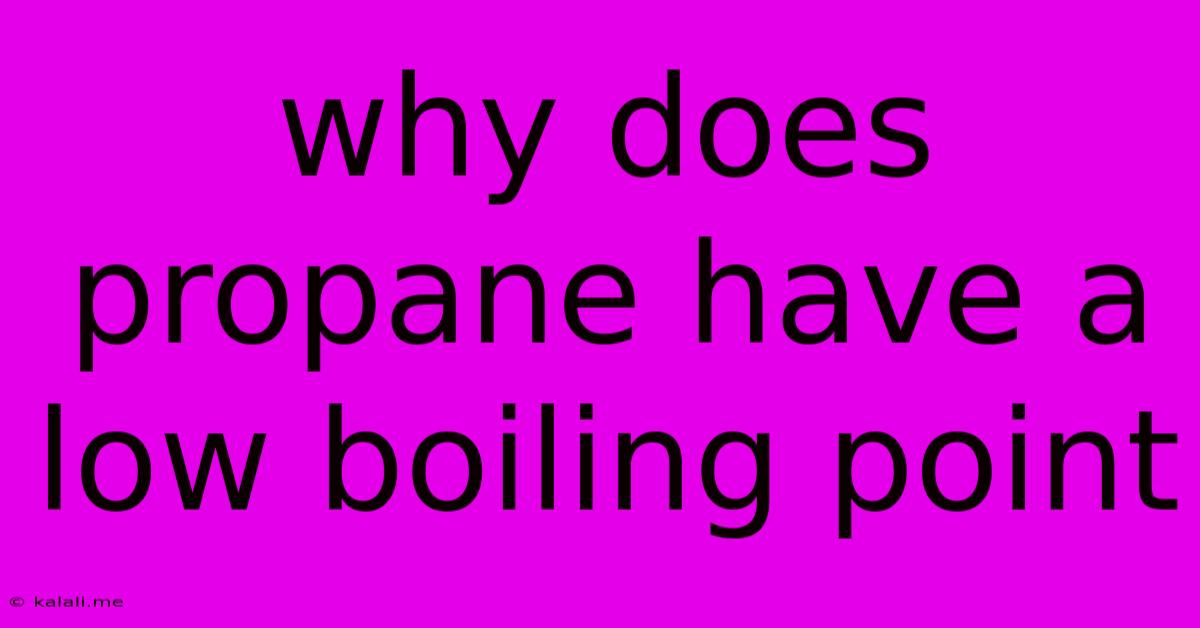Why Does Propane Have A Low Boiling Point
Kalali
May 22, 2025 · 3 min read

Table of Contents
Why Does Propane Have a Low Boiling Point? Understanding Intermolecular Forces
Propane's low boiling point (-42°C or -44°F) is a key characteristic that dictates its applications as a fuel and refrigerant. Understanding this property requires examining the intermolecular forces present in propane molecules and how these forces impact the energy required for a phase change from liquid to gas. This article will delve into the science behind propane's low boiling point, exploring the concepts of van der Waals forces and molecular structure.
What are Intermolecular Forces?
Intermolecular forces are the attractive forces that exist between molecules. These forces are much weaker than the intramolecular forces (bonds) that hold atoms together within a molecule, but they are crucial in determining the physical properties of substances, including their boiling points. The stronger the intermolecular forces, the more energy is required to overcome these attractions and transition to the gaseous phase, resulting in a higher boiling point.
Propane's Molecular Structure and Weak Intermolecular Forces:
Propane (C₃H₈) is a simple hydrocarbon, consisting of three carbon atoms bonded together in a chain, with eight hydrogen atoms attached. Its molecules are nonpolar, meaning there's no significant difference in electronegativity between the carbon and hydrogen atoms, leading to an even distribution of charge.
This nonpolar nature limits the types of intermolecular forces present in propane. The primary forces are weak London dispersion forces, also known as van der Waals forces. These forces arise from temporary, instantaneous dipoles created by the movement of electrons within the molecule. These temporary dipoles induce similar dipoles in neighboring molecules, resulting in weak attractive interactions.
Comparing Propane to Other Substances:
To further understand propane's low boiling point, let's compare it to substances with stronger intermolecular forces:
-
Water (H₂O): Water has a much higher boiling point (100°C) due to the presence of strong hydrogen bonds, a special type of dipole-dipole interaction. Hydrogen bonds are significantly stronger than London dispersion forces.
-
Ethanol (C₂H₅OH): Ethanol also has a higher boiling point than propane because it possesses both London dispersion forces and hydrogen bonding due to the hydroxyl (-OH) group.
Because propane relies solely on weak London dispersion forces, less energy is needed to overcome these intermolecular attractions and transition to the gaseous phase, leading to its low boiling point.
Factors Affecting London Dispersion Forces in Propane:
While London dispersion forces are weak, their strength is influenced by factors such as:
-
Molecular size and shape: Larger molecules with more electrons generally exhibit stronger London dispersion forces due to increased opportunities for temporary dipole formation. However, propane is relatively small.
-
Molecular surface area: A larger surface area allows for more interaction points between molecules, enhancing London dispersion forces. Propane's relatively compact structure limits surface area.
Conclusion:
Propane's low boiling point is a direct consequence of its nonpolar nature and the dominance of weak London dispersion forces as the primary intermolecular interaction. The relatively small size and limited surface area of propane molecules further contribute to the weakness of these forces. Understanding these fundamental principles of intermolecular forces is key to appreciating the physical properties and diverse applications of propane.
Latest Posts
Latest Posts
-
Blender Brick Node Not Displaying Correctly
May 22, 2025
-
Why Does My Toilet Randomly Run
May 22, 2025
-
Error Connecting To Agent No Such File Or Directory
May 22, 2025
-
Logrotate Failed Sqlnet Log Failed Permission Denied
May 22, 2025
-
It Was Pleasure To Meeting You
May 22, 2025
Related Post
Thank you for visiting our website which covers about Why Does Propane Have A Low Boiling Point . We hope the information provided has been useful to you. Feel free to contact us if you have any questions or need further assistance. See you next time and don't miss to bookmark.